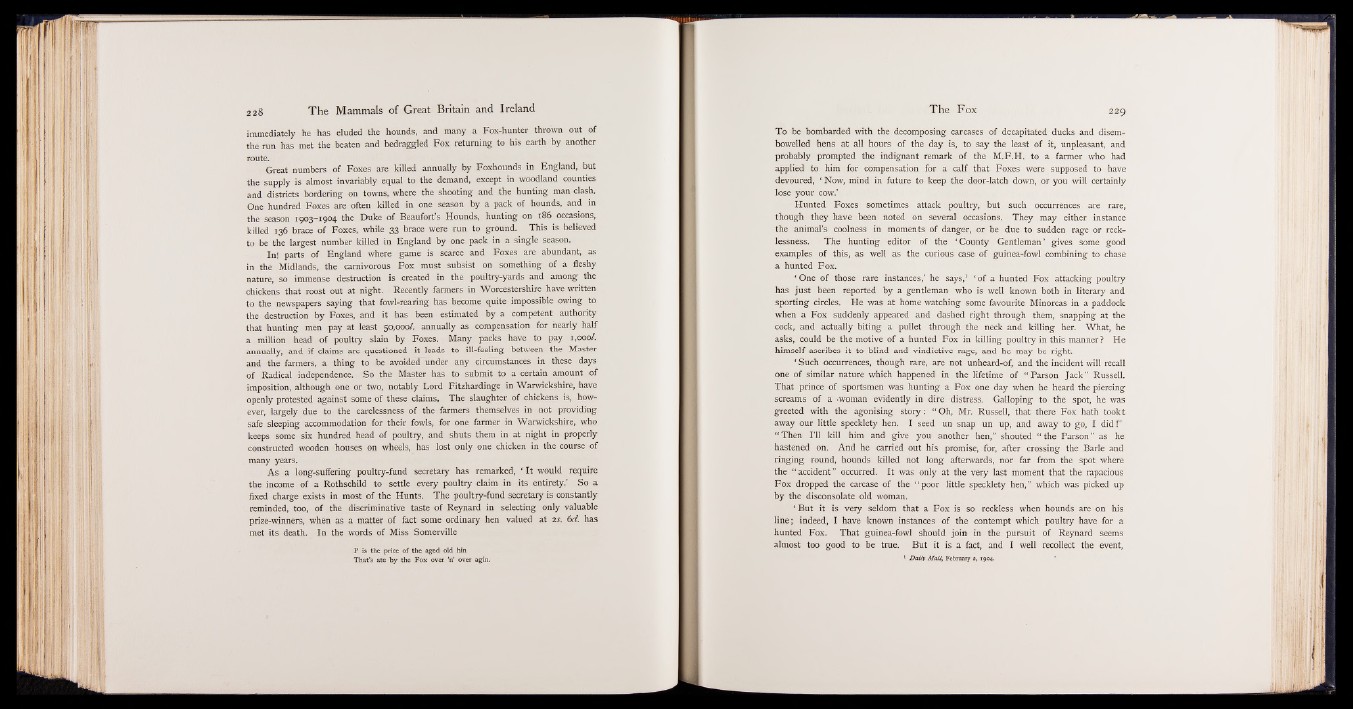
immediately he has eluded the hounds, and many a Fox-hunter thrown out of
the run has met the beaten and bedraggled Fox returning to his earth by another
route.G
reat numbers of Foxes are killed annually by Foxhounds in England, but
the supply is almost invariably equal to the demand, except in woodland counties
and districts bordering on towns, where the shooting and the hunting man clash.
One hundred Foxes are often killed in one season by a pack of hounds, and in
the season 1903—1904 the Duke of Beaufort’s Hounds, hunting on 186 occasions,
killed 136 brace of Foxes, while 33 brace were run to ground. This is believed
to be the largest number killed in England by one pack in a single season.
Ini parts of England where game is scarce and Foxes are abundant, as
in the Midlands, the carnivorous Fox must subsist on something of a fleshy
nature, so immense destruction is created in the poultry-yards and among the
chickens that roost out at night. Recently farmers in Worcestershire have written
to the newspapers saying that fowl-rearing has become quite impossible owing to
the destruction by Foxes, and it has been estimated by a competent authority
that hunting men pay at least 50,000/. annually as compensation for nearly half
a million head of poultry slain by Foxes. Many packs have to pay 1,000/.
annually, and if claims are questioned it leads to ill-feeling between the Master
and the farmers, a thing to be avoided under any circumstances in these days
of Radical independence. So the Master has to submit to a certain amount of
imposition, although one or two, notably Lord Fitzhardinge in Warwickshire, have
openly protested against some of these claims. The slaughter of chickens is, however,
largely due to the carelessness of the farmers themselves in not providing
safe sleeping accommodation for their fowls, for one farmer in Warwickshire, who
keeps some six hundred head of poultry, and shuts them in at night in properly
constructed wooden houses on wheels, has lost only one chicken in the course of
many years.
As a long-suffering poultry-fund secretary has remarked, ‘ It would require
the income of a Rothschild to settle every poultry claim in its entirety.’ So a
fixed charge exists in most of the Hunts. The poultry-fund secretary is constantly
reminded, too, of the discriminative taste of Reynard in selecting only valuable
prize-winners, when as a matter of fact some ordinary hen valued at 2s. 6 d. has
met its death. In the words of Miss Somerville
To be bombarded with the decomposing carcases of decapitated ducks and disembowelled
hens at all hours of the day is, to say the least of it, unpleasant, and
probably prompted the indignant remark of the M.F.H. to a farmer who had
applied to him for compensation for a calf that Foxes were supposed to have
devoured, ‘ Now, mind in future to keep the door-latch down, or you will certainly
lose your cow.’
Hunted Foxes sometimes attack poultry, but such occurrences are rare,
though they have been noted on several occasions. They may either instance
the animal’s coolness in moments of danger, or be due to sudden rage or recklessness.
The hunting editor of the ‘ County Gentleman’ gives some good
examples of this, as well as the curious case of guinea-fowl combining to chase
a hunted Fox.
‘ One of those rare instances,’ he says,1 ‘ of a hunted Fox attacking poultry
has just been reported by a gentleman who is well known both in literary and
sporting circles. He was at home watching some favourite Minorcas in a paddock
when a Fox suddenly appeared and dashed right through them, snapping at the
cock, and actually biting a pullet through the neck and killing her. What, he
asks, could be the motive of a hunted Fox in killing poultry in this manner ? He
himself ascribes it to blind and vindictive rage, and he may be right.
‘ Such occurrences, though rare, are not unheard-of, and the incident will recall
one of similar nature which happened in the lifetime of “ Parson Jack ” Russell.
That prince of sportsmen was hunting a Fox one day when he heard the piercing
screams of a -woman evidently in dire distress. Galloping to the spot, he was
greeted with the agonising story: “ Oh, Mr. Russell, that there Fox hath tookt
away our little specklety hen. I seed un snap un up, and away to go, I did 1”
“ Then I ’ll kill him and give you another hen,” shouted “ the Parson” as he
hastened on. And he carried out his promise, for, after crossing the Barle and
ringing round, hounds killed not long afterwards, nor far from the spot where
the “ accident” occurred. It was only at the very last moment that the rapacious
Fox dropped the carcase of the “ poor little specklety hen,” which was picked up
by the disconsolate old woman.
‘ But it is very seldom that a Fox is so reckless when hounds are on his
line; indeed, I have known instances of the contempt which poultry have for a
hunted Fox. That guinea-fowl should join in the pursuit of Reynard seems
almost too good to be true. But it is a fact, and I well recollect the event,
1 D aily Mail, February 2, 1904.